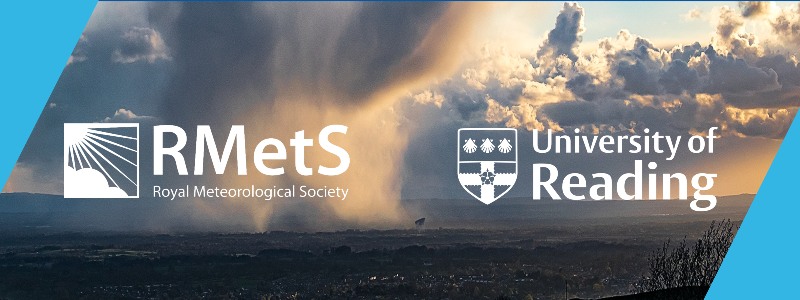Meteorological Masterclass Series Returns
Anticipating floods, droughts and heatwaves
Following the success of last Autumn’s Meteorological Masterclass Series – Winter Storms in European Weather and Climate, the RMetS announces a second series with the University of Reading, taking place in February and March.
These masterclasses are intended to provide additional training for professionals working in Meteorology and Climate Science, and its operational application.
The theme for this series will be ‘Anticipating floods, droughts and heatwaves’. Flooding, droughts and heatwaves have massive human, social and economic consequences. World-wide, floods are estimated to have caused losses in excess of US$1 trillion over the last few decades, and major European heatwaves since 2000 are believed to be linked to over 100,000 deaths. Such events are widely expected to become more frequent and extreme as the climate changes and are often exacerbated in highly populated urban areas. However, advances in meteorological research offers new capabilities for representing, anticipating and understanding the dynamics of these events: from sub-grid-scale convective processes; the interaction of weather and climate with the urban environments; to the development of an advanced prediction tool to manage flood-risk days-to-months ahead.
During this three-part masterclass, leading experts from the University of Reading will present the latest science for understanding and predicting weather, climate and its impacts. Topics will span from short-range Numerical Weather Prediction, extended-range forecasting and the role of long-term climate change. The webinars will refresh and deepen attendees’ knowledge of the latest meteorological science and research.
Each masterclass webinar will be held from 3pm to 4.30pm (GMT), consisting of a presentation followed by the opportunity for questions and discussion with the speaker. Whilst the webinars are part of a series, participants can choose which seminars they attend.
Last year 542 delegates participated throughout the series, and for anyone who was not able to join, or who may want to watch back, you can revisit the full masterclass series playlist via our YouTube channel here.
Please note that this year the video recordings will only be available to people who have registered and paid to attend and will be made available within a few days of the event. There will also be an option to ask the speakers questions via email for one week after the video goes live.
EVENT DATES AND TOPICS
Wednesday 24 February 2021: Flood forecasting hours to months ahead
Dr Linda Speight: University of Reading
Linda will be presenting on the state-of-the-art in probabilistic hydrometeorological forecasting hours to months ahead, and the use and communication of flood forecasts to support decision making.
The Masterclass will look at how well we can forecast floods at a range of scales and how we can balance lead time and uncertainty to answer the important operational question “when and where will impact occur?” Linda will also cover how flood forecasting can be used in locations with limited data to support early action and will close with a discussion on what the future research directions are for flood forecasting.
Wednesday 10 March 2021: Representing convection in Numerical Weather Prediction models and its implications
Prof Bob Plant: University of Reading
The forecasting of convective precipitation remains among the most challenging and most stubborn problems in meteorology. In this talk, Bob will review the fundamental scientific challenges, discuss recent progress and advances being made in this field, and highlight some of the implications for operational forecasting.
Wednesday 24 March 2021: Heatwaves and climate change in urban microclimates
Prof Sue Grimmond: University of Reading
The focus of this talk is on heatwaves and how urban areas can exacerbate their impact because of the well-known canopy layer urban heat island effects, and why cities and their residents are particularly vulnerable. Impacts of heatwaves have been very significant if people are not appropriately prepared (e.g. the 2003 European heatwave).
The attention will be directed to the important impact of scale and an understanding of the dynamics of urban climate, challenges in predictions and advance warning, and strategies and interventions for heat stress mitigation.
Further details, with full abstracts and biographies for each session and speaker, will be released in the coming weeks. To register for any of the webinars and keep up to date, please visit the events page here.
You can also follow discussion on the events using the hashtag #MetMasterclass



Kommentare sind geschlossen.